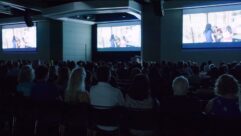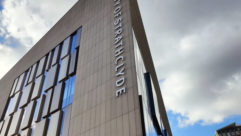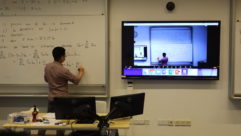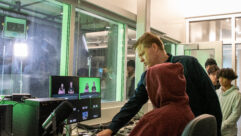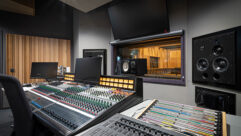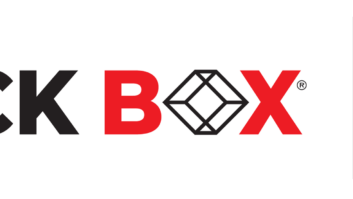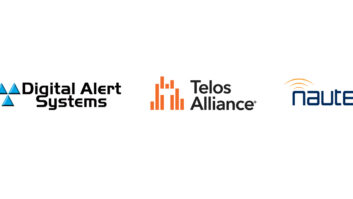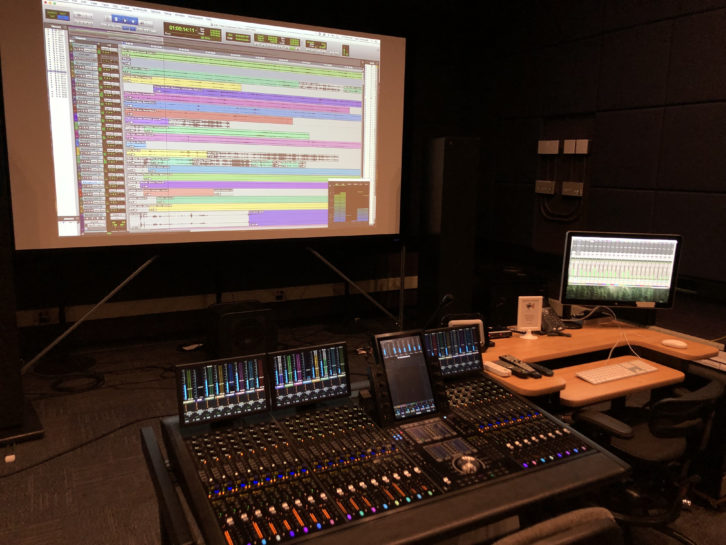
A modern audio education must introduce students to audio networking as a foundational skill. Students learning about working in Dante networks, now have access to Dante Domain Manager and it’s led to some innovative workflows.
At the Recording Arts program at University of Colorado, students learn recording, mixing, postproduction, and mastering. Dante and Dante Domain Manager have become integral technologies within the school’s Music & Entertainment Industry Studies department (MEIS), which offers a series of programs focused on contemporary music styles, commercial music business, and music production.
“We teach a variety of skills in our recording program designed to help students prepare for careers in the live and recorded music industry, as well as in film and television and sports media, so technology is crucial for us,” said Scott Burgess, Manager of Recording Labs and Live Sound, and a Lecturer for the Department of MEIS. “We started using Dante in our department a few years ago to reduce setup times for events, but it’s such an important technology that achieving Dante Level-One certification is now part of our curriculum, and we’re looking to expand that.
“Our setup times are very limited, so anything we can do to save time is a big deal,” said Burgess. “So, I got a Dante card for our Soundcraft mixer and a license to Virtual Sound Card, we plug in one network cable, and we’re ready to record the event! That’s how we started.”
The MEIS production team began to think of ways to incorporate more audio networking on campus, including using it to connect their six main studios, which are spread across two large buildings. The CU Denver campus covers a lot of ground, and if the team is asked to put on a show in the Student Center, for example, the ability to jump from the departmental network and onto the campus network is a significant capability. The challenge with making this jump to another subnet, traditionally, was a work order needed to be filed with IT to trigger a process that would eat up the resources of both his department and the IT department. But with Dante Domain Manager, that process is now unnecessary.
“This is where Dante Domain Manager comes into play,” Burgess said. “While it’s possible to work with campus IT to put everything on the same subnet, we can more efficiently use Dante Domain Manager to just set up and manage our own domains.”
Dante Domain Manager organizes a network into zones called “domains” that each have individual access requirements, making it clear and easy to know who can access any area of the system. All activity is logged, tagged, and date-stamped so problems can be quickly identified and solved.
“And Dante Domain Manager also means that if we move to a different location, which happens often, we don’t have to bother campus IT to reconfigure the network,” said Burgess. “We just get into Domain Manager and find the device, or better yet, if the system pulls the same address then we don’t have to do anything, which is the glory of Dante.”
 Over the next few semesters, as part of the expanding networked audio curriculum, the MEIS team has the goal of being able to produce a live concert in a venue anywhere on campus, and then record that band or event from several other rooms at the same time – each with different purposes in mind. The idea is for everyone to grab a mix and then upload to the server so the teams can compare notes and see how everyone did.
Over the next few semesters, as part of the expanding networked audio curriculum, the MEIS team has the goal of being able to produce a live concert in a venue anywhere on campus, and then record that band or event from several other rooms at the same time – each with different purposes in mind. The idea is for everyone to grab a mix and then upload to the server so the teams can compare notes and see how everyone did.
“We’re still mulling over all the possibilities, but we’re in the middle of implementing a major rewrite to our curriculum, so it’s a perfect time for us to explore all the possibilities of the Dante network,” added Burgess. “Dante is part of our workflow and infrastructure now, and it’s an important part of our curriculum. I’ve had alums come back and say that that they are really glad we have a focus on networked audio because in the real world, they are up to their ears in Dante, making the experience here very valuable.”
The faculty and students at Dalarna University, Sweden, use Dante and Dante Domain Manager as a secure audio network for a diverse range of projects, including long distance, live show and music productions.
The media programs at Dalarna are recognized for their AV network distance productions. The university’s Mediehuset (The Media House) has worked with distance productions for several years and is regarded as one of the leading institutes of higher education in Scandinavia within this field. Each semester, The Media House takes on several remote-distance media productions as a way to expose students to AV network technologies.
In one scenario, live stage productions held in a theater near the University are broadcast to movie theaters in surrounding communities, greatly expanding the theater group’s audience. In addition to the video and audio being presented remotely — often by as far as 50 kilometers away, and to multiple remote theaters simultaneously — live AV audience feedback is brought back to the performers so they get the experience of performing for a full, live audience.
“We rent a fiber connection between the remote locations and The Media House, and we connect the data network on location to our Dante network here. That way we just have stage boxes at the remote location,” explained Henrik Carlsson, an Instructor for the Sound and Music Production program. “And here in our studio we have our Dante enabled mixing console and it works the same way as if it were an all-in-house production.”
The Media House comprises the university’s music studio, radio studio, television studio, 25+ student film and music edit suites, and all things media related.
In addition to theater projects, the team also produces a series of remote interviews and talk shows, collaborating with other local schools and their media students.
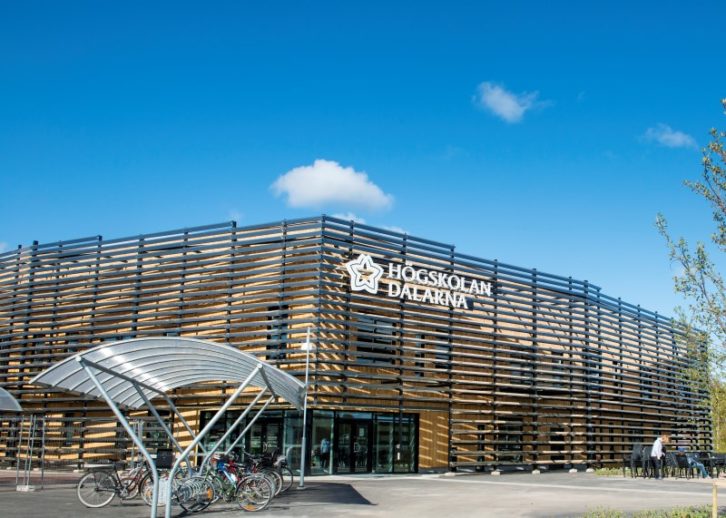 “We turn the student’s work into a remote television production by taking cameras and microphones to the site, with our team back here in the studio,” said Carlsson. “The remote aspect is that we don’t need to move an audio mixer and our entire control room team stays in house, just the cameras and the microphones need to travel.”
“We turn the student’s work into a remote television production by taking cameras and microphones to the site, with our team back here in the studio,” said Carlsson. “The remote aspect is that we don’t need to move an audio mixer and our entire control room team stays in house, just the cameras and the microphones need to travel.”
Carlsson and his students also use a similar system allowing for remote coverage of sports events, speeches and presentations, VIP announcements, and other news-type productions. Some events are shared live; others are edited and produced for posting through YouTube or Facebook. As a way to support and demonstrate technology for a regional conference on digital creativity, the team produced a live music collaboration over a fiber connection, among musicians in different locations performing live, together.
“The part that impressed me was the fact that every sound that was heard at the remote location, actually came back here to our studio first,” said Carlsson. “So, when the remote guitarist played his guitar, the line signal was converted with Dante, sent here to The Media House into the main computer, processed with amp simulators, overdrives, delays and similar things, and then returned as part of the PA mix back to the live venue. Because of Dante, we had no latency issues, and the musicians had a great shared experience even though they were over 100 kilometers apart.”
Carlsson added that he has a goal of keeping the Film and Television edit rooms and the Sound and Music edit rooms as similar as possible. If all the video suites are booked up, but there is a free suite on the audio side, then the film student can use a music edit suite, and vice versa. The Dante network enables this level of equipment sharing, and Dante Domain Manager provides the necessary management tools to make it viable.
Dante Domain Manager enables user authentication, role-based security, and audit capabilities for Dante networks while allowing seamless expansion of Dante systems over any network infrastructure. Each domain has individual access requirements, making it clear and easy to know who can access any area of the system. All activity is logged, tagged and date-stamped.
“We now have almost all of our infrastructure moved to a Dante network, and with around 400 students in The Media House at any given moment, Dante Domain Manager has become critical for protecting the network, setting permissions, and isolating subnets,” said Carlsson. “The way we have it set up now, it works very well with everything connected basically to the same switches that the IT department uses for bringing internet and intranet to everything. But we are very secure and protected from mistakes or malicious intent.”
Dante Domain Manager enables audio to be plugged into any Ethernet jack, anywhere on campus, and route the audio data to where it needs to go. Once setup in Dante Domain Manager, authorized users of Dante-enabled devices do not have to perform any special configuration; Dante Controller provides the same easy-to-use experience no matter how large the network becomes.
As the team continues to explore more remote production possibilities, and ways to expand their audio network capabilities, Carlsson is now looking to use Dante with Dante Domain Manager to tie together the school’s three large lecture halls, to be able to expand the audience for large presentations. If a hall becomes standing room only, and additional coverage is needed, the team wants to be able to quickly send audio and video to another lecture hall for an overflow audience.


